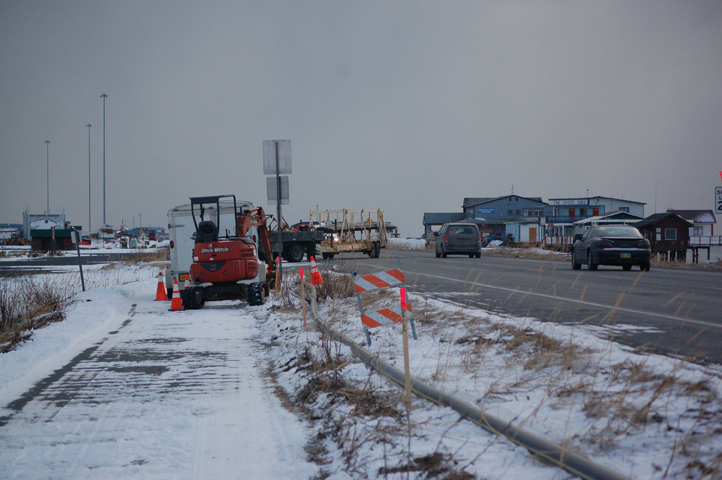The city of Homer won’t appeal a decision by Kenai Superior Court Judge Charles Huguelet that overturned a part of the Homer Natural Gas Special Assessment District treating condominium units the same as lots. The special assessment district funds construction of a natural gas distribution line throughout the entire city.
Condominium owner Ken Castner had filed a civil suit against the city challenging its process of assessing condo units $3,293.50 each — the same charge for a two-bedroom condo unit in a 10-unit complex as a 10-unit apartment complex. Huguelet said that process imposed “an arbitrary, unreasonable and inequitable burden” on Castner.
“The city reviewed the costs and benefits of filing an appeal and concluded that, on balance, it was in the overall best interest of the community to accept the judge’s decision and move on,” City Manager Walt Wrede said in a press release last week.
Wrede said the city thought it would have prevailed on appeal if it had chosen to do so.
Castner owns three condominium units in the Kachemak Bay Title Building. Because of the structure of the condo association, Castner also has a share in some condos, including a boiler room, and not just an office condo. Instead of paying the per-lot assessment of $3,283.30, the Kachemak Bay Title Building condo owners would have been assessed nine times, or $29,549.70, and Castner assessed $9,849.90.
“I think it’s the correct decision. I’m glad to put it behind me and I look forward to them rewriting their ordinance,” Castner said last week.
The city argued that Castner’s properties were assessed on a “per lot” basis because his properties derived a benefit from the gas line. Huguelet agreed that under Alaska law properties that benefit from a service are subject to an assessment. Castner conceded that he gained a benefit, but that he was being assessed disproportionately to the benefit received. Huguelet noted that regardless of lot size or building on it, each lot would receive one, 2-inch pipe to connect natural gas service to the lot.
“Lots or parcels that have multiple habitable units and leases were provided the same access to the gas line through one 2-inch high-density polyethylene pipe to the lot and were charged only one assessment charge per lot or parcel. In effect, condominium owners in Plaintiff’s building were assessed a charge nine times higher for the same single 2-inch high density polyethylene pipe,” Huguelet wrote.
In his decision, Huguelet granted one victory to the city. He wrote that the process by which property owners approved the Homer Natural Gas Special Assessment District did not violate the Alaska Constitution. Castner had argued that the city violated his constitutional rights by not requiring the district be approved by an election. To fail, the special assessment district approval process required that a majority of property owners file a written objection to the district. Each property, including condo units, got one vote. Huguelet said a special assessment district is an acceptable exception to the Alaska Constitution’s requirement that a vote be ratified by a majority before a debt can be contracted.
Castner said he would not appeal that part of the ruling. If the city had appealed, he said he would have filed a cross appeal on that point.
“Just because you call something a special assessment district doesn’t mean it is,” Castner said.
Wrede said there are about 118 condo assessments on 16 lots. If condos are not charged an assessment per unit, that would decrease the number of assessments, with a net loss of 102 assessment properties and an impact of about $340,000. With 3,855 assessments, the increase per-assessment would be about $88.
However, that’s based on the preliminary assessment roll and estimate of construction costs. At the Feb. 10 Homer City Council meeting, City Attorney Thomas Klinkner presented a memorandum outlining the process for levying special assessments. Construction of the natural gas distribution line was started last year, with the downtown portion finished. Completion of the entire system is scheduled for this year. Contractor Utility Technologies Inc. already has started construction of the Homer Spit leg of the line. Once the line is built and the full cost known, the city will prepare an assessment roll, Klinkner wrote. It will review the roll to look at things like duplicate properties, that is, for properties with multiple owners that might have been listed twice. The assessment will then be divided by the actual construction cost and the corrected number of properties. There will be a review process, with a public hearing to allow property owners to object to the roll. Property owners also will be given a chance to file written objections. The city council would then correct any errors or inequalities and confirm the final assessment roll by a resolution.
“This ruling will be another adjustment consideration as the process moves forward,” Wrede said in last week’s press release. “The city will work with Mr. Castner to address the ‘proportionality and reasonableness’ problem identified by Judge Huguelet. The city hopes to find a solution that complies with the judge’s decision, but is also fair to the other property owners in the special assessment district.”
Michael Armstrong can be reached at michael.armstrong@homernews.com.



